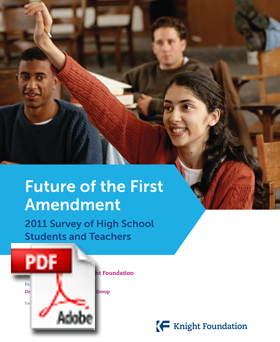
@FastCompany: underlying tension between students and teachers in new report about social media and the First Amendment
2011 Report: Future of the First Amendment
Eric Newton, Special Adviser to the President at Knight Foundation:
See also previous years of FoFA research: 2007 Report | 2006 Report | 2004 Report.
Last week, Knight Foundation released a new report in honor of Constitution Day, showing that as social media’s popularity has grown among teens, so has appreciation for the First Amendment. In fact, more than 91 percent of students who use social networking to get news and information on a daily basis believe people should be allowed to express unpopular opinions.
Today, Fast Company wrote about the report, focusing on the underlying tensions between teachers and students when it comes to teens’ use of social media and its impact on freedom of expression:
“Conducted through interviews with 12,000 students and 900 high school teachers in the U.S., the study found a solid majority of American teachers believe limits should be placed on what their students say and do on social networks. For example, only 36% believe students have the right to express their opinions of teachers and school administrators online without the risk of in-school punishment.”
The San Bernadino Sun’s Executive Editor Frank Pine also wrote about the report’s findings:
“Frankly, it boggles my mind that five of any 10 Americans anywhere at any time would say that we have too much freedom, but there you go. If that freaks you out, you might sit down before you read on, because there are scary facts ahead.”
Coinciding with the report’s release, Knight Foundation’s Eric Newton wrote an op-ed noting that:
“This year’s First Amendment survey also shows students’ use of digital media for news and information is growing. Since 2006, it has doubled, with three quarters of the students getting news from social media several times a week.
Appreciation for freedom is improving right along with that. Students who say the First Amendment “goes too far” has fallen from 45 percent in 2006 to just 24 percent this year.”
Not all of the news is good, Newton said, particularly when it comes to teachers’ attitudes:
“The survey says most teachers do not support free expression rights in a school context. They don’t think the school newspaper should print controversial articles. They don’t think students should post things about school on their Facebook pages. And they mostly think social media hurt teaching.”
A significant number of newspapers ran Newton’s op-ed, including the Miami Herald, the Philadelphia Inquirer, the Boston Herald, The Washington Post, Buffalo News, the San Jose Mercury News, Wisconsin State Journal, Syracuse.com, and The Tallahassee Democrat,
The Associated Press covered the release of the report, noting that more and more teenagers are supporting the First Amendment. Several other websites, blogs and foundations also profiled the report including Poynter, Huffington Post, SF Gate, All Facebook, The San Bernadino Sun and the Benton Foundation.
The full Future of the First Amendment Report can be found online. The foundation’s press release announcing the report’s findings and a link to the audio playback of the press conference announcing the report’s release are also available.
Recent Content
-
Community Impactarticle ·
-
Community Impactarticle ·
-
Community Impactarticle ·


